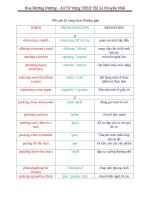TỪ VỰNG TOEIC unit 10
Bạn đang xem bản rút gọn của tài liệu. Xem và tải ngay bản đầy đủ của tài liệu tại đây (256.06 KB, 61 trang )
Unit 10
PUT LOG TERR MAR PATH PEN/PUN MATR/MATER AQU Words
from Mythology
Quiz 10-1 Quiz 10-2 Quiz 10-3 Quiz 10-4 Quiz 10-5 Review Quizzes 10
PUT comes from the Latin verb putare, meaning “to think, consider, or
believe.” So, for example, a reputation is what others think of you. But when
the root shows up in such words as compute, dispute, and deputy, its meaning
is harder to trace.
reputed
Believed to be a certain way by popular opinion.
• The 15th-century prince Vlad the Impaler is reputed to have inspired the
character Dracula, though in fact, evil though Vlad was, Dracula's creator
only borrowed his nickname.
Reputed is used constantly today by reporters, and almost always to describe
suspected criminals—“the reputed mobster,” “the reputed drug kingpin,” “the
reputed gang leader,” etc. But the word shouldn't be left to journalists; your
elderly aunt may, for instance, be reputed to have made a large fortune in oil,
or to have had four husbands who all died mysteriously. Reputed is easy to
confuse with reputable, and they used to mean the same thing—that is,
“having a good reputation”—but it's become rare to hear reputed used with
that meaning today.
disrepute
Loss or lack of good reputation; disgrace.
• The family had fallen into disrepute after the conviction and imprisonment
of his father and uncle.
A reputation can be easy to lose, and someone who is no longer respectable
may eventually find he's become genuinely disreputable—the kind of person
that almost no one wants to be seen with. Disrepute isn't only for individuals:
A company may fall into disrepute as a result of news stories about its
products' defects; drug scandals have brought entire sports into disrepute; and
a scientific theory may fall into disrepute as a result of new discoveries.
impute
To attribute.
• The British imputed motives of piracy to American ships trying to prevent
them from interfering with American trade during the War of 1812.
Imputing something to someone (or something) usually means observing
something invisible in that person (or thing). We may impute meaning to a
play or novel, or to a casual remark by a friend, that was never intended.
Many of us like to impute bad motives to others, while always regarding our
own motives as pure. In tax law, imputed income is something that isn't
actual money but might as well be—for example, the free use of a car lent to
you by your employer.
putative
Generally supposed; assumed to exist.
• To strengthen the case for the defense, a putative expert took the stand.
Putative is almost always used to express doubt or skepticism about a
common belief. Thus, Tintagel Castle in Cornwall, a picturesque ruin, is the
putative fortress of the medieval King Arthur. The residents of New York
City are putatively chic, neurotic, rude, and dangerous. And cable TV is full
of putative experts, who often turn out not to have much knowledge of the
subjects they're talking about.
LOG, from the Greek word logos, meaning “word,” “speech,” or “reason,” is
found particularly in English words that end in -logy and -logue. The ending logy often means “the study of”; so, for instance, biology is the study of life,
and anthropology is the study of humans. And -logue usually indicates a type
of discussion; thus, dialogue is conversation between two people or groups,
and an epilogue is an author's last words on a subject. But exceptions aren't
hard to find.
physiology
(1) A branch of biology dealing with the
processes and activities by which living things, tissues, and cells function. (2)
The life processes and activities of a living thing or any of its parts.
• For students planning to go to medical school, the university's most popular
major is Human Physiology.
The Latin root physio- generally means “physical,” so human physiology
deals with just about everything that keeps us alive and working, and other
physiology specialties do the same for other animals and for plants. To do
anything serious in the field of health, you've obviously got to know how the
body's organs and cells function normally. Physiology used to be considered
separately from anatomy, which focuses on the body's structures; however,
it's now known that structure and function can't easily be separated in a
scientific way, so “anatomy and physiology” are often spoken of in the same
breath.
methodology
science or field.
A set of methods or rules followed in a
• Some researchers claimed that Dr. Keller's methodology was sloppy and
had led to unreliable conclusions.
The methodology employed in an experiment is essential to its success, and
bad methodology has spoiled thousands of research projects. So whenever a
piece of research is published in a scientific or medical journal, the
researchers always carefully describe their methodology; otherwise, other
scientists couldn't possibly judge the quality of what they've done.
ideology
party.
The set of ideas and beliefs of a group or political
• By the time she turned 19, she realized she no longer believed in her
family's political ideology.
The root ideo-, as you might guess, means “idea.” Ideas and theories about
human behavior can always be carried too far, since such behavior is very
hard to pin down. So ideological thinkers—people who come up with large
theories about how the world works and try to explain everything (and maybe
even predict the future) according to those theories—are almost always
disappointed, sooner or later, to find that it doesn't really work out. A person
intensely devoted to a set of political ideas or theories can be called an
ideologue—a translation of the French idéologue, a word actually coined by
Napoleon as a label for those political thinkers full of ideas he had no use for.
cardiology
diseases.
The study of the heart and its action and
• After his heart attack, he actually bought himself a cardiology textbook and
set about learning everything he could about his unreliable organ.
The root card- (closely related to cord—see CORD) shows up in many heartrelated words. Cardiologists frequently find themselves studying
cardiograms, the charts of heart activity, made by machines called
cardiographs. Heart attacks, and deaths caused by them, have both declined
as a result of better medical emergency procedures, cholesterol-lowering
drugs, and a decline in smoking. But the factors likely to actually improve
heart health, such as better diets and more cardiovascular exercise (exercise,
such as running, that improves the heart and blood vessels), haven't made any
progress at all. So we should all be prepared to perform cardiopulmonary
resuscitation (an emergency procedure done on someone whose heart has
stopped, to get the heart and lungs working again).
Quiz 10-1
A. Indicate whether the following pairs of words have the same or
different meanings:
1. putative / supposed
same ___ / different ___
2. ideology / beliefs
same ___ / different ___
3. reputed / questioned
same ___ / different ___
4. cardiology / game theory
same ___ / different ___
5. disrepute / shame
same ___ / different ___
6. methodology / carefulness
same ___ / different ___
7. impute / compute
same ___ / different ___
8. physiology / bodybuilding
same ___ / different ___
Answers
B. Choose the closest definition:
1. methodology
a. endurance b. patience c. authority d. system
2. impute
a. imply b. revise c. attribute d. defy
3. reputed
a. famous b. accused c. determined d. supposed
4. ideology
a. notion b. philosophy c. standard d. concept
5. putative
a. assumed b. appointed c. solved d. ignored
6. cardiology
a. ear specialty b. heart specialty c. brain specialty d. nerve
specialty
7. disrepute
a. argument b. violence c. untruth d. disgrace
8. physiology
a. sports medicine b. body language c. study of medicine d. study
of organisms
Answers
TERR comes from the Latin terra, “earth.” A territory is a large expanse of
land. Terra firma is Latin for “firm ground” as opposed to the swaying seas.
A terrace is a leveled area, often one created for farming on a sloping hill.
And the French word for potato, pomme de terre, means literally “apple of
the earth.”
parterre
(1) A decorative garden with paths between the beds of
plants. (2) The back area of the ground floor of a theater, often under the
balcony.
• The city's park boasts a beautiful parterre with many varieties of roses.
Parterre comes to English by way of French, where it means “on the
ground.” And in the early years of the theater, the parterre was truly on the
ground. In Shakespeare's day, an English theater's parterre was the cheap
standing-room area right in front of the stage, normally filled with rowdy
spectators. The original idea of the French parterre garden, with its carefully
designed plots and walkways, was to present an artistic pattern when seen
from above—from a balcony, a raised terrace, or the top of an outdoor
staircase. English gardeners responded with garden designs that tried to make
their viewers half-forget that they were seeing something created by humans
rather than untamed nature itself.
subterranean
Underground.
• In Carlsbad Caverns National Park there is an astonishing subterranean
chamber over half a mile long.
A tunnel is a subterranean road or pathway, and a subway is a subterranean
railway. The subterranean vaults at Fort Knox hold billions of dollars of gold
reserves. Subterranean reservoirs called aquifers are tapped for water; in
places where the pressure on the subterranean water is great enough, a hole
drilled in the ground will bring it bubbling to the surface.
terrarium
An enclosure, usually transparent, with a layer of
dirt in the bottom in which plants and sometimes small animals are kept
indoors.
• When no one was watching, they dropped their snake in the fifth-grade
terrarium, and then waited in the hall to hear the screams.
The turtle exhibit at a zoo is often in the form of a terrarium, as are some of
the exhibits at a plant conservatory. In an ant terrarium, elementary-school
students watch the ants dig their network of tunnels as if no one were
watching. Terrariums try to create conditions as close as possible to a natural
habitat. A covered terrarium can often sustain itself for months on the
moisture trapped inside. But creating a good terrarium requires careful
control not only of humidity but also of temperature, as well as good
ventilation; the lighting should include the full spectrum of sunlight as well
as a day-night regulator.
terrestrial
(1) Having to do with Earth or its inhabitants. (2)
Living or growing on land instead of in water or air.
• The roadrunner, although a largely terrestrial bird, can take flight for short
periods when necessary.
Everything on or having to do with Earth can be called terrestrial. Mercury,
Venus, and Mars are often called the terrestrial planets, since they are rocky
balls somewhat like Earth rather than great globes of gas like Jupiter, Saturn,
Uranus, and Neptune. Something extraterrestrial comes from beyond the
earth and its atmosphere; the word can be used to describe anything “out of
this world,” from moon rocks to meteors. Turning to the second sense of
terrestrial, animals are often divided into the terrestrial (land-living) and the
aquatic (water-living). And sometimes terrestrial animals are contrasted with
arboreal animals, those that live in trees.
MAR, from the Latin word mare, meaning “sea,” brings its salty tang to
several English words. A submarine is an undersea ship. Marine means
basically “relating to the sea,” so when the Continental Marines were
established back in 1775, their job was to provide on-board security on naval
ships; but they immediately began to be used on land as well, and the marines
have continued to operate on both land and sea ever since.
marina
A dock or harbor where pleasure boats can be moored
securely, often with facilities offering supplies or repairs.
• The coast of Florida has marinas all along it for the use of anything from
flimsy sailboats to enormous yachts.
Marina comes straight from Latin, where it means simply “of the sea.” At a
modern marina, sailors can acquire whatever they need for their next
excursion, or they can tie up their boats until the next weekend comes along.
Some even imitate John D. MacDonald's famous detective hero Travis
McGee, who lives on his boat in Miami and rarely leaves the marina.
aquamarine
(1) A transparent blue or blue-green gem.
(2) A pale blue or greenish blue that is the color of clear seawater in sunlight.
• Many of the houses on the Italian Riviera are painted aquamarine to match
the Mediterranean.
Aqua marina is Latin for “seawater,” so when a lovely blue-green form of the
semiprecious gem known as beryl was given an English name several
centuries ago, aquamarine seemed appropriate. Aquamarine is the ideal color
that most of us carry around in our heads when we imagine the waters that
lap the shores of the Greek and Caribbean islands on a sunny day. But even
the Mediterranean and the Caribbean can take on lots of other colors
depending on weather conditions.
mariner
A seaman or sailor.
• When he signed on as a mariner, the young Ishmael never suspected that the
ship would be pursuing a great white whale.
In Coleridge's Rime of the Ancient Mariner, an old seaman tells of how, by
shooting a friendly albatross, he had brought storms and disaster to his ship,
and how as punishment his shipmates hung the great seabird around the
mariner's neck and made him wear it until it rotted. The word mariner has
occasionally been used to mean simply “explorer,” as in the famous Mariner
spaceflights in the 1960s and '70s, the first to fly close to Mars, Venus, and
Mercury.
maritime
(1) Bordering on or having to do with the sea. (2)
Having to do with navigation or commerce on the sea.
• As a result of the ocean, Canada's Maritime Provinces—New Brunswick,
Nova Scotia, and Prince Edward Island—have a late spring but a mild winter.
The maritime countries of Portugal and England produced many seafaring
explorers during the 16th and 17th centuries, many of whom sailed under the
flags of other countries. Sailing for the Spanish, Ferdinand Magellan
captained the ship that was the first to circle the world, charting many new
maritime routes as it went. Henry Hudson, funded by the Dutch, sailed up
what we call today the Hudson River, claiming the maritime area that now
includes New York City for the Netherlands.
Quiz 10-2
A. Complete the analogy:
1. crepe : pancake :: parterre : ___
a. balcony b. planet c. garden d. parachute
2. motel : motorist :: marina : ___
a. dock b. pier c. sailor d. boat
3. aquarium : water :: terrarium : ___
a. plants b. turtles c. rocks d. earth
4. urban : city :: maritime : ___
a. beach b. dock c. sea d. harbor
5. aquatic : water :: terrestrial : ___
a. sea b. land c. forest d. mountain
6. pink : red :: aquamarine : ___
a. blue b. watery c. turquoise d. yellow
7. submarine : underwater :: subterranean : ___
a. blue b. belowground c. hollow d. rumbling
8. logger : lumberjack :: mariner : ___
a. doctor b. lawyer c. chief d. sailor
Answers
B. Match the definition on the left to the correct word on the right:
1. theater area
a. mariner
2. blue-green gem b. terrestrial
3. under the ground c. marina
4. near the sea
d. terrarium
5. contained habitat e. maritime
6. seaman
f. parterre
7. small harbor
g. subterranean
8. earthly
h. aquamarine
Answers
PATH comes from the Greek word pathos, which means “feeling” or
“suffering.” So a pathetic sight moves us to pity, and a sympathetic friend
“feels with” you when you yourself are suffering.









